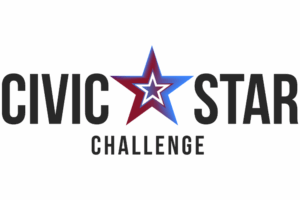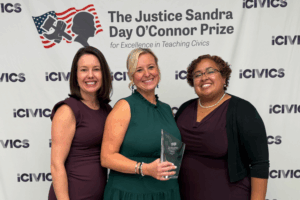The iCivics Educator Network has increased its elementary representation by nearly 48% this year, the highest level of elementary participation the Educator Network has seen. This growth reflects iCivics’ ongoing efforts to build out its elementary offerings, like the Private i History Detectives curriculum and iCivics Readers.
The Educator Network is made up of about 350 civics, history, government, and social studies teachers—now including 31 elementary educators (nearly double the representation of previous years)—who serve as champions and ambassadors for high-quality, equitable civic education.
“The iCivics Educator Network is a professional community of the best social studies and civics teachers who are building a movement to reinstate the civic mission of schools in every corner of this country—and that includes elementary educators,” said Natacha Scott, iCivics Director of Educator Engagement. “It is so important to start civic education at a young age, and we are excited to see more elementary teachers learning about iCivics and joining the Educator Network to begin building civic values in students early on.”
The Educator Network enables teachers to share best practices in civics and social studies, playing a key role in helping to empower students to engage as citizens in this country’s constitutional democracy, now and in the future. It provides opportunities for teachers to network with their peers, take part in focus groups, beta test new games and products, engage in special professional development opportunities, and build their voices as advocates for high-quality history and civic education.
Since it was founded in 2011, many iCivics Educator Network members have become some of the most prominent voices from the field advocating for civic education through the opportunities that the network provides. They are permanent fixtures as speakers at prestigious education conferences, routinely appear in both national and local media, and are recognized as excelling in the classroom.
“The iCivics Educator Network not only helped me develop best practices for teaching civics and government, but has allowed me to collaborate with educators from across the country,” said Michael Martirone, a high school social studies teacher in New Jersey and an Educator Network member since 2016. “I’ve had the opportunity to engage in meaningful pedagogical conversations, share civics resources, and seek new perspectives about my content matter—all of which has made me a better teacher for my students.”
The iCivics Educator Network includes educators with a variety of talents, interests, and teaching histories representing a diversity of grade levels K–12, geographic areas, and personal demographics. This year’s cohort saw an increase in educators from urban and “red” areas, as well as more educators who are earlier in their careers.
“We want the Educator Network to reflect the diverse experiences of teachers across the country,” said Scott. “We want to know how the educator in rural Kansas is teaching about due process; we want to know how the educator in a purple area balances teaching about elections. Sharing our stories is the best way for us to learn from each other and strengthen our mission to make civic education a nationwide priority.”
For more information about the iCivics Educator Network, and to find out how you can apply to be a part of the next cohort, visit https://vision.icivics.org/get-involved/educators/

